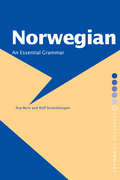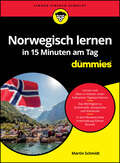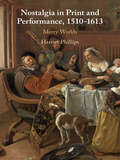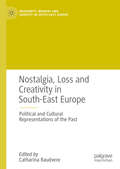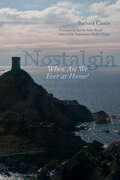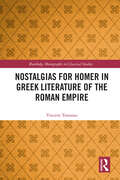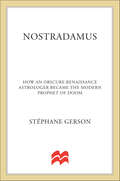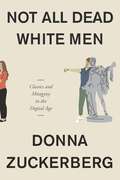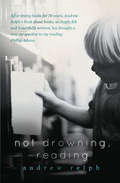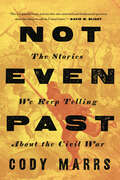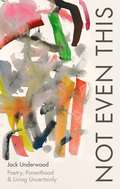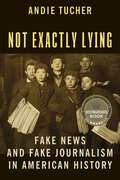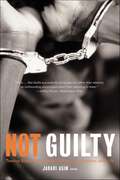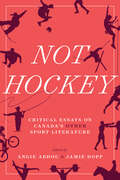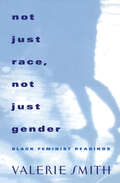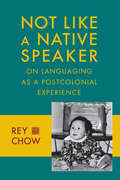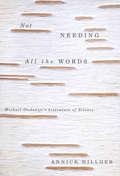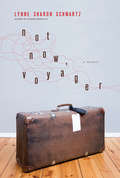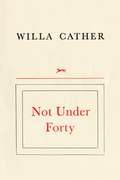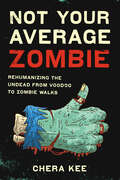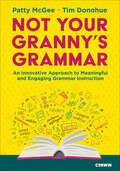- Table View
- List View
Norwegian: An Essential Grammar (Routledge Essential Grammars)
by Rolf Strandskogen Ase-Berit StrandskogenNorwegian: An Essential Grammar is a reference guide to the most important aspects of contemporary Norwegian as used by native speakers. The Grammar presents a fresh and accessible description of the language. Explanations are clear, free from jargon and often accompanied by exercises. The book gives a simple, step-by-step presentation of the grammatical systems of Norwegian and demonstrates and explains usages which have proved difficult for those learning the language in the past. It is clearly laid-out for easy reference making it accessible for those at a beginner/intermediate level. This is the ideal reference source for all learners, whether studying independently or in a class.
Norwegisch lernen in 15 Minuten am Tag für Dummies (Für Dummies)
by Martin SchmidtNur ein Viertelstündchen Norwegisch am Tag Sie wollen Norwegisch lernen, aber der Gedanke, stundenlang Vokabeln und Grammatik zu pauken, schreckt Sie ab? Dann ist dieses Buch genau das Richtige für Sie! In kurzen, auf 15 Minuten pro Tag begrenzten Lektionen bringt es Ihnen auf unterhaltsame Weise die norwegische Sprache näher. So erfahren Sie im Handumdrehen alles Wichtige über Grammatik, Aussprache und übliche Redewendungen. Durch regelmäßige Wiederholungsfragen können Sie Ihr Wissen testen und mithilfe des zum Download verfügbaren Audiomaterials auch die Aussprache üben. Nach nur drei Monaten beherrschen Sie die Grundlagen spielend. Sie erfahren Wie Sie in jeder Situation die richtigen Worte finden Mit welchen Redewendungen Sie brillieren Welche Wörter Sie nicht verwechseln sollten Wie Sie das Norwegische richtig aussprechen
Nos vemos en Ítaca
by María Isabel Espiñeira Castelos«Las cosas no siempre son lo que parecen y en ocasiones saber demasiado no hace que la vida sea mejor.» <P><P> Amanda se queda a la vez sin novio y sin trabajo y decide ir a un pueblo perdido en busca de la herencia de su tía Irene, de la que sabe muy poco. Unas cartas antiguas le mostrarán quien fue de verdad su tía a la vez que cambiarán su propia vida de manera inesperada.
Nostalgia in Print and Performance, 1510–1613: Merry Worlds
by Harriet PhillipsFor many people in early modern England the Reformation turned the past into another country: the 'merry world'. Nostalgia for this imaginary time, both widespread and widely contested, was commodified by a burgeoning entertainment industry. This book offers a new perspective on the making of 'Merry England', arguing that it was driven both by the desires of audiences and the marketing strategies of writers, publishers and playing companies. Nostalgia in Print and Performance juxtaposes plays with ballads and pamphlets, just as they were experienced by their first consumers. It argues that these commercial fictions played a central role in promoting and shaping nostalgia. At the same time, the fantasy of the merry world offered a powerfully affective language for conceptualising longing. For playwrights like Shakespeare and others writing for the commercial stage, it became a way to think through the dynamics of audience desire and the aesthetics of repetition.
Nostalgia, Loss and Creativity in South-East Europe: Political and Cultural Representations of the Past (Modernity, Memory and Identity in South-East Europe)
by Catharina RaudvereWhere nostalgia was once dismissed a wistful dream of a never-never land, the academic focus has shifted to how pieces of the past are assembled as the elements in alternative political thinking as well as in artistic expression. The creative use of the past points to the complexities of the conceptualization of nostalgia, while entering areas where the humanities meet the art world and commerce. This collection of essays shows how this bond is politically and socially visible on different levels, from states to local communities, along with creative developments in art, literature and religious practice. Bringing together scholars from a range of disciplines, the book offers analyses from diverse theoretical perspectives, united by an interest in the political and cultural representations of the past in South-East Europe from a long-term perspective. By emphasising how the relationship between loss and creative inspiration are intertwined in cultural production and history writing, these essays cover themes across South-East Europe and provide an insight into how specific agents – intellectuals, politicians, artists – have represented the past and have looked towards the future.
Nostalgia: When Are We Ever at Home?
by Barbara CassinWinner, French Voices Grand PrizeNostalgia makes claims on us both as individuals and as members of a political community. In this short book, Barbara Cassin provides an eloquent and sophisticated treatment of exile and of desire for a homeland, while showing how it has been possible for many to reimagine home in terms of language rather than territory.Moving from Homer’s and Virgil’s foundational accounts of nostalgia to the exilic writings of Hannah Arendt, Cassin revisits the dangerous implications of nostalgia for land and homeland, thinking them anew through questions of exile and language. Ultimately, Cassin shows how contemporary philosophy opens up the political stakes of rootedness and uprootedness, belonging and foreignness, helping us to reimagine our relations to others in a global and plurilingual world.
Nostalgias for Homer in Greek Literature of the Roman Empire (Routledge Monographs in Classical Studies)
by Vincent TomassoThis volume investigates how versions of Trojan War narratives written in Greek in the first through fifth centuries C.E. created nostalgia for audiences. In ancient education, the Iliad and the Odyssey were used as models through which students learned Greek language and literature. This, combined with the ruling elite’s financial encouragement of re-creations of the Greek past, created a culture of nostalgia. This book explores the different responses to this climate, particularly in the case of the third-century C.E. poet Quintus of Smyrna’s epic Posthomerica. Positioning itself as a sequel to the Iliad and a prequel to the Odyssey, the Posthomerica is unique in its middle-of-the-road response to nostalgia for Homer’s epics. This book contrasts Quintus’ poem with other responses to nostalgia for Homeric narratives in Greek literature of the Roman Empire. Some authors contradict pivotal events of the Iliad and Odyssey, such as the first-century orator Dio Chrysostom’s Trojan Speech, which claims that the Trojan hero Hector did not in fact die, contrary to the Iliad’s account. Others re-created Homeric narratives but did not contradict them, improvising some elements and adding others. Quintus strikes a compromise in his epic, re-imagining Homeric narrative by introducing new characters and scenarios, while at the same time retaining the Iliad and Odyssey’s aesthetics. Nostalgias for Homer in Greek Literature of the Roman Empire is of interest to students and scholars working on Homeric reception and the Greek literature of the Roman Empire, as well as those interested in classical literature and reception more broadly.
Nostradamus: How an Obscure Renaissance Astrologer Became the Modern Prophet of Doom
by Stéphane GersonWe all know the name Nostradamus, but who was he really? Why did his predictions become so influential in Renaissance Europe and then keep resurfacing for nearly five centuries? And what does Nostradamus's endurance in the West say about us and our own world? In Nostradamus: How an Obscure Renaissance Astrologer Became the Modern Prophet of Doom, historian Stéphane Gerson takes readers on a journey back in time to explore the life and afterlife of Michel de Nostredame, the astrologer whose Prophecies have been interpreted, adopted by successive media, and eventually transformed into the Gospel of Doom for the modern age. Whenever we seem to enter a new era, whenever the premises of our worldview are questioned or imperiled, Nostradamus offers certainty and solace. In 1666, guests at posh English dinner parties discussed his quatrain about the Great Fire of London. In 1942, the Jewish writer Irène Némirovsky latched her hopes for survival to Nostradamus' prediction that the war would soon end. And on September 12, 2001, teenagers proclaimed on the streets of Brooklyn that "this guy, Nostradamus" had seen the 9/11 attacks coming. Through prodigious research in European and American archives, Gerson shows that Nostradamus — a creature of the modern West rather than a vestige from some antediluvian era — tells us more about our past and our present than about our future. In chronicling the life of this mystifying figure and the lasting fascination with his predictions, Gerson's book becomes a historical biography of a belief: the faith that we can know tomorrow and master our anxieties through the powers of an extraordinary but ever more elusive seer.
Not All Dead White Men: Classics and Misogyny in the Digital Age
by Donna ZuckerbergSome of the most controversial and consequential debates about the legacy of the ancients are raging not in universities but online, where alt-right men’s groups deploy ancient sources to justify misogyny and a return of antifeminist masculinity. Donna Zuckerberg dives deep to take a look at this unexpected reanimation of the Classical tradition.
Not Drowning, Reading
by Andrew RelphAn inspiring memoir about the art and the gift of reading, this compilation of essays shares Andrew Relph's life story via the books the author has encountered, beginning with those he read as if his life depended on it after struggling with a reading disability. From Amis to Bellow, Blake to Gallico, and Shakespeare to Woolf, these explorations ask why it is that books are so important to us and why our relationships with writers and characters can be as vital as any we form in “real life.” As it studies the psychological solace of books, this narrative also introduces classic and contemporary literature guaranteed to intrigue all book lovers.
Not Even Past: The Stories We Keep Telling about the Civil War
by Cody MarrsHow the Civil War endures in American life through literature and culture.Recipient of the Eric Hoffer Award's Montaigne MedalThe American Civil War lives on in our collective imagination like few other events. The story of the war has been retold in countless films, novels, poems, memoirs, plays, sculptures, and monuments. Often remembered as an emancipatory struggle, as an attempt to destroy slavery in America now and forever, it is also memorialized as a fight for Southern independence; as a fratricide that divided the national family; and as a dark, cruel conflict defined by its brutality. What do these stories, myths, and rumors have in common, and what do they teach us about modern America? In this fascinating book, Cody Marrs reveals how these narratives evolved over time and why they acquired such lasting power. Marrs addresses an eclectic range of texts, traditions, and creators, from Walt Whitman, Abram Ryan, and Abraham Lincoln to Margaret Mitchell, D. W. Griffith, and W. E. B. Du Bois. He also identifies several basic plots about the Civil War that anchor public memory and continually compete for cultural primacy. In other words, from the perspective of American cultural memory, there is no single Civil War. Whether they fill us with elation or terror; whether they side with the North or the South; whether they come from the 1860s, the 1960s, or today, these stories all make one thing vividly clear: the Civil War is an ongoing conflict, persisting not merely as a cultural touchstone but as an unresolved struggle through which Americans inevitably define themselves. A timely, evocative, and beautifully written book, Not Even Past is essential reading for anyone interested in the Civil War and its role in American history.
Not Even This: Poetry, parenthood and living uncertainly
by Jack Underwood'[A] clever, cosmic, moving and funny parenting physics and poetry adventure . . . It's wonderful' Max Porter via Twitter'Clear, nimble and dexterous' Ocean Vuong'It's a magical book. An incantation to be fully present, fully concerned, fully alive' Luke KennardIn this highly original book-length lyric essay, a father and poet reflects on how his daughter's birth at a time of great global uncertainty inspired him to rediscover with fresh urgency the importance of language as a realm of 'intimacy, overlap, hope and trust'. Poetry can uniquely offer an understanding of the world which brings its complexity within reach - yet does not seek to reduce or explain that complexity away. Poetry is a form through which we might reckon with this uncertain world, learn to inhabit our precarious life more fluently and, in turn, offer what we learn to our children.From Joan of Arc to the unfathomable gravity of supermassive black holes, from metaphor to quantum mechanics, Not Even This is a moving, thought-provoking work, full of delights. Jack Underwood is open and attentive to the questions that the world and his daughter continue to present: thrilling, terrifying, fundamental.
Not Exactly Lying: Fake News and Fake Journalism in American History
by Andie TucherLong before the current preoccupation with “fake news,” American newspapers routinely ran stories that were not quite, strictly speaking, true. Today, a firm boundary between fact and fakery is a hallmark of journalistic practice, yet for many readers and publishers across more than three centuries, this distinction has seemed slippery or even irrelevant. From fibs about royal incest in America’s first newspaper to social-media-driven conspiracy theories surrounding Barack Obama’s birthplace, Andie Tucher explores how American audiences have argued over what’s real and what’s not—and why that matters for democracy.Early American journalism was characterized by a hodgepodge of straightforward reporting, partisan broadsides, humbug, tall tales, and embellishment. Around the start of the twentieth century, journalists who were determined to improve the reputation of their craft established professional norms and the goal of objectivity. However, Tucher argues, the creation of outward forms of factuality unleashed new opportunities for falsehood: News doesn’t have to be true as long as it looks true. Propaganda, disinformation, and advocacy—whether in print, on the radio, on television, or online—could be crafted to resemble the real thing. Dressed up in legitimate journalistic conventions, this “fake journalism” became inextricably bound up with right-wing politics, to the point where it has become an essential driver of political polarization. Shedding light on the long history of today’s disputes over disinformation, Not Exactly Lying is a timely consideration of what happens to public life when news is not exactly true.
Not Guilty: Twelve Black Men Speak Out on Law, Justice, and Life
by Jabari AsimPatrick Dorismond, Abner Louima, and Amadou Diallo -- hear what a jury of prominent African Americans has to say about the black man's struggle for justice in AmericaPrompted by the killing of Amadou Diallo and the acquittal of the four New York City police officers who mistook him for an armed criminal, this collection of essays by prominent black male writers offers twelve unique and startling perspectives on what it's like for a black man living in an inherently racist society.Coming from a broad spectrum of economic and social backgrounds, the poets, journalists, lawyers, writers, and academics that make up this jury write forcefully and eloquently about growing up and raising sons, identifying with others and yearning to be set apart, attempting reasonable discourse, and succumbing to unspeakable anger. Together these essays deconstruct the monolithic myths that shroud our nation's black men and offer small rays of hope that on the streets, at school and work, and in the courtroom justice will be served.
Not Hockey: Critical Essays on Canada’s Other Sport Literature
by Angie Abdou Jamie DoppIn this carefully curated collection of essays, editors Jamie Dopp and Angie Abdou go beyond their first collection, Writing the Body in Motion, to engage with the meaning of sport found in Canadian sport literature. How does “sport” differ from physically risky recreational activities that require strength and skill? Does sport demand that someone win? At what point does a sport become an art? With the aim of prompting reflections on and discussions of the boundaries of sport, contributors explore how literature engages with sport as a metaphor, as a language, and as bodily expression. Instead of a focus on what is often described as Canada’s national pastime, contributors examine sports in Canadian literature that are decidedly not hockey. From skateboarding and parkour to fly fishing and curling, these essays engage with Canadian histories and broader societal understandings through sports on the margin. Interspersed with original reflections by iconic Canadian literary figures such as Steven Heighton, Aritha Van Herk, Thomas Wharton, and Timothy Taylor, this volume is fresh and intriguing and offers new ways of reading the body.
Not Just Race, Not Just Gender: Black Feminist Readings
by Valerie SmithFrom the nineteenth century articulations of Sojourner Truth to contemporary thinkers like Patricia J. Williams, Black feminists have always recognized the mutual dependence of race and gender. Detailing these connections, Not Just Race, Not Just Gender explores the myriad ways race and gender shape lives and social practices. Resisting essentialist tendencies, Valerie Smith identifies black feminist theorizing as a strategy of reading rather than located in a particular subjective experience. Her intent is not to deny the validity of black women's lived experience, but rather to resist deploying a uniform model of black women's lives that actually undermines the power of black feminist thought. Whether reading race or gender in the Central Park jogger case or in contemporary media, like Livin' Large, Smith displays critical rigor that promises to change the way we think about race and gender.
Not Like a Native Speaker
by Rey ChowRey Chow is Anne Firor Scott Professor of Literature at Duke University and the author of numerous influential books, including several published by Columbia University Press: Primitive Passions; The Protestant Ethnic and the Spirit of Capitalism; and Sentimental Fabulations, Contemporary Chinese Films. A book about her writings, The Rey Chow Reader, was edited by Paul Bowman. Her work has appeared in more than ten languages.
Not Like a Native Speaker: On Languaging as a Postcolonial Experience
by Rey ChowRey Chow is Anne Firor Scott Professor of Literature at Duke University and the author of numerous influential books, including several published by Columbia University Press: Primitive Passions; The Protestant Ethnic and the Spirit of Capitalism; and Sentimental Fabulations, Contemporary Chinese Films. A book about her writings, The Rey Chow Reader, was edited by Paul Bowman. Her work has appeared in more than ten languages.
Not Like a Native Speaker: On Languaging as a Postcolonial Experience
by Rey ChowRey Chow is Anne Firor Scott Professor of Literature at Duke University and the author of numerous influential books, including several published by Columbia University Press: Primitive Passions; The Protestant Ethnic and the Spirit of Capitalism; and Sentimental Fabulations, Contemporary Chinese Films. A book about her writings, The Rey Chow Reader, was edited by Paul Bowman. Her work has appeared in more than ten languages.
Not Like a Native Speaker: On Languaging as a Postcolonial Experience
by Rey ChowAlthough the era of European colonialism has long passed, misgivings about the inequality of the encounters between European and non-European languages persist in many parts of the postcolonial world. This unfinished state of affairs, this lingering historical experience of being caught among unequal languages, is the subject of Rey Chow's book. A diverse group of personae, never before assembled in a similar manner, make their appearances in the various chapters: the young mulatto happening upon a photograph about skin color in a popular magazine; the man from Martinique hearing himself named "Negro" in public in France; call center agents in India trained to Americanize their accents while speaking with customers; the Algerian Jewish philosopher reflecting on his relation to the French language; African intellectuals debating the pros and cons of using English for purposes of creative writing; the translator acting by turns as a traitor and as a mourner in the course of cross-cultural exchange; Cantonese-speaking writers of Chinese contemplating the politics of food consumption; radio drama workers straddling the forms of traditional storytelling and mediatized sound broadcast. In these riveting scenes of speaking and writing imbricated with race, pigmentation, and class demarcations, Chow suggests, postcolonial languaging becomes, de facto, an order of biopolitics. The native speaker, the fulcrum figure often accorded a transcendent status, is realigned here as the repository of illusory linguistic origins and unities. By inserting British and post-British Hong Kong (the city where she grew up) into the languaging controversies that tend to be pursued in Francophone (and occasionally Anglophone) deliberations, and by sketching the fraught situations faced by those coping with the specifics of using Chinese while negotiating with English, Chow not only redefines the geopolitical boundaries of postcolonial inquiry but also demonstrates how such inquiry must articulate historical experience to the habits, practices, affects, and imaginaries based in sounds and scripts.
Not Needing all the Words
by Annick HillgerNot Needing all the Words looks at Ondaatje's work in relation to the post-Cartesian idea of the modern subject as split and alienated. Highlighting the distinction between aesthesis and logic, Hillger traces the ways in which Ondaatje responds to the continuing process of silencing art in the modern age of reason.
Not Now, Voyager: A Memoir
by Lynne Sharon SchwartzEver since the explorations of Marco Polo and the travels of Montaigne, a lively dialogue has persisted about the pros and cons of travel. Lynne Sharon Schwartz joins this dialogue with a memoir that raises both serious and amusing questions about travel, using her own experiences as vivid illustrations.Not Now, Voyager takes us on a voyage of self-discovery as the author traces how travel has shaped her sensibilities from childhood through adulthood. She makes an adolescent visit to Miami Beach, where she confronts the powerful sensation of not belonging; she goes to Rome as a young woman and ponders the difference between ignorance and innocence; she ventures to Jamaica and witnesses political and social unrest; and she takes a family road trip to Montreal and watches her daughters come to startling realizations of their own.Schwartz’s personal history takes on new shapes, and her feelings about travel change as she shows us who she started out as and who she has become. Above all, this memoir exemplifies a mode of travel in and of itself: the mind on a journey or quest, pausing here and there, sometimes by design, sometimes by serendipity, lingering, occasionally backtracking, but always on the move.
Not Under Forty: Large Print
by Willa CatherFor Willa Cather, "the world broke in two in 1922 or thereabouts. " The whole legacy of Western civilization stood on the far side of World War I, and in the spiritually impoverished present she looked back to that. To that she directed readers of these essays, declaring that anyone under forty years old would not be interested in them. But she was wrong: since its first publication in 1936, "Not Under Forty" has appealed to readers of all ages who share Cather's concern for excellence, for what endures, in literature and in life.
Not Your Average Zombie: Rehumanizing the Undead from Voodoo to Zombie Walks
by Chera KeeA thorough analysis of zombies in popular culture from the 1930s to contemporary society.The zombie apocalypse hasn&’t happened—yet—but zombies are all over popular culture. From movies and TV shows to video games and zombie walks, the undead stalk through our collective fantasies. What is it about zombies that exerts such a powerful fascination? In Not Your Average Zombie, Chera Kee offers an innovative answer by looking at zombies that don&’t conform to the stereotypes of mindless slaves or flesh-eating cannibals. Zombies who think, who speak, and who feel love can be sympathetic and even politically powerful, she asserts.Kee analyzes zombies in popular culture from 1930s depictions of zombies in voodoo rituals to contemporary film and television, comic books, video games, and fan practices such as zombie walks. She discusses how the zombie has embodied our fears of losing the self through slavery and cannibalism and shows how &“extra-ordinary&” zombies defy that loss of free will by refusing to be dehumanized. By challenging their masters, falling in love, and leading rebellions, &“extra-ordinary&” zombies become figures of liberation and resistance. Kee also thoroughly investigates how representations of racial and gendered identities in zombie texts offer opportunities for living people to gain agency over their lives. Not Your Average Zombie thus deepens and broadens our understanding of how media producers and consumers take up and use these undead figures to make political interventions in the world of the living.&“Kee provides a compelling synthesis of theory and criticism . . . useful for horror scholars interested in how portrayals of zombie intersect with race and gender.&” —Popular Culture Studies Journal&“Kee&’s Not Your Average Zombie is an important book . . . Put simply: if it's the one book you read about or cite on zombie, you've made an excellent choice.&” —American Quarterly&“[Not Your Average Zombie] offers a fresh theoretical framework to a fast-growing field . . . A fascinating contribution to the critical conversation about the zombie as a fantastic figure.&” —Journal of the Fantastic in the Arts&“I&’m impressed by Kee&’s scholarship across several fields—film history and gender and critical race studies, especially—and her cultural and historical contextualizing of the current zombie renaissance.&” —James H. Cox, University of Texas at Austin, author of The Red Land to the South: American Indian Writers and Indigenous Mexico
Not Your Granny’s Grammar: An Innovative Approach to Meaningful and Engaging Grammar Instruction
by Patricia Grawehr McGee Timothy J DonohueLet′s make grammar instruction exciting, relevant, and accessible for all learners! Grammar is the forgotten foundational skill! It plays a critical role in helping students become skilled readers and writers. Yet, traditional approaches to teaching grammar, through drills and memorization, no longer resonate with students. In today′s fast-paced world, students need a more engaging and meaningful way to learn grammar that connects to their real-world experiences. That′s where Not Your Granny′s Grammar comes in—offering an innovative approach to teaching grammar that is both efficient and effective. In this book, authors Patty McGee and Tim Donohue introduce Grammar Study, their classroom-tested approach that blends explicit instruction and inquiry to address the challenges and gaps in traditional grammar lessons. The book includes 40+ engaging and innovative, research-based lessons that are organized in flexible lesson progressions to provide teachers with easy-to-implement, fun, and learning-rich experiences for students in Grades 2-8. Guiding educators step-by-step in nurturing grammar knowledge and usage for both themselves and their students, this book Offers lessons and strategies that allow students to study grammar in the context of everyday reading and writing Emphasizes that grammar is not a static set of rules but an ever-evolving system that differs from community to community Provides time management principles for teachers to creatively integrate meaningful grammar instruction into their literacy or ELA block Highlights the importance of grammar in writing and clarifies the difference between spoken and written grammar Includes a robust grammar refresher to help teachers feel more confident in their grammar knowledge as well as an appendix showing alignment with Common Core Standards Drawing from the science of writing, Not Your Granny′s Grammar revolutionizes grammar instruction so teachers can help students build actionable and detailed grammar knowledge and skills that enrich their academic writing for years to come.
